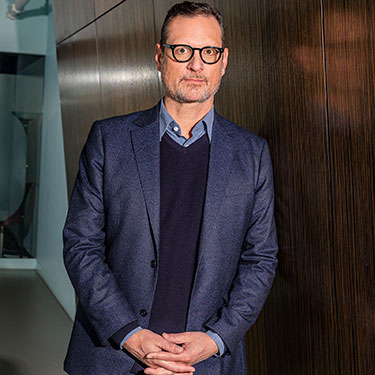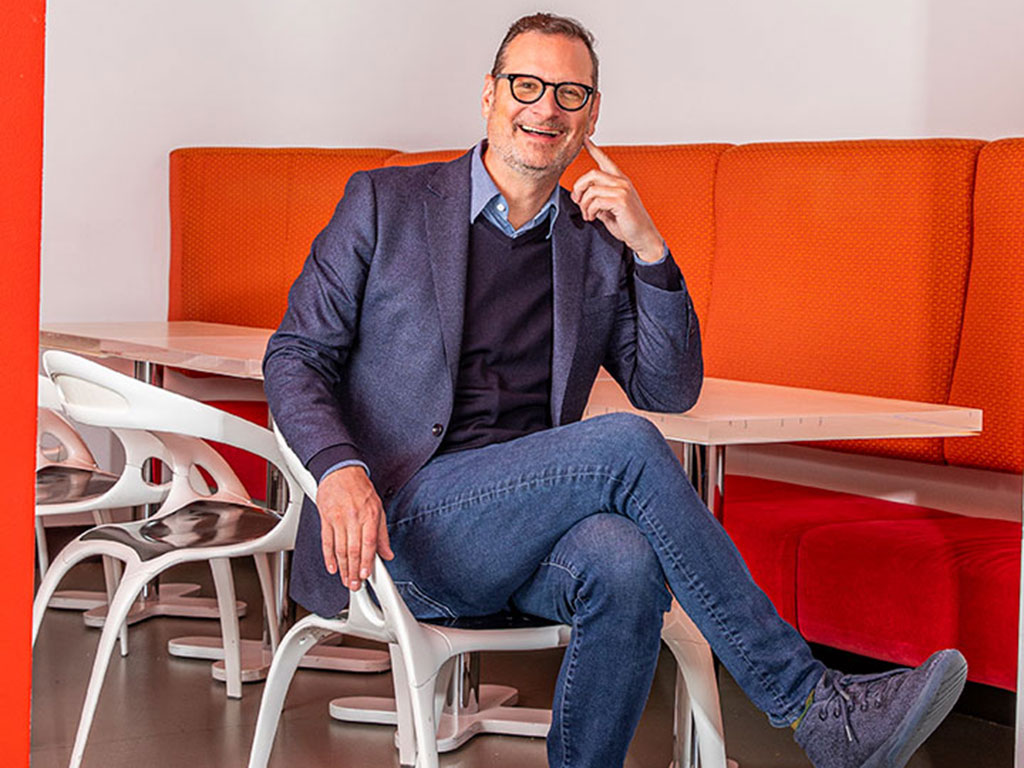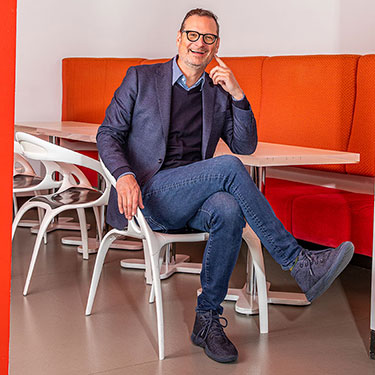May 17, 2023 In The Office With
John Halley on Finding Opportunity in Change
“We're always trying to set the pace for the business,” says the president of Paramount Advertising.
Paramount ad sales chief John Halley wasn’t always in ad sales. With an early stint in real estate and a career in the music industry during the Napster era, he’s grown into his position by learning how to find the benefits of technological disruption.
Halley took over as president of advertising for Paramount from longtime executive Jo Ann Ross in September 2022. In the last several months, Halley and Ross collaborated to restructure the organization and pushed through innovations to meet the industry’s evolving demands.
Nicole Bitette: Jo Ann Ross—a major force in the advertising industry for decades—was previously in your role. How did (and do) you approach that transition—personally, with the Ad Sales team, and with clients?
John Halley: The keyword is transition. We didn’t want a leadership change to feel jarring, either to our teams at Paramount or our agency partners or clients. Jo Ann has been the steady hand and face of the business for decades. Our partners know Jo Ann so very well and trust her.
Transition means Jo Ann is present and involved and helps lead the conversation. We are going to build on the legacy of her relationships, not leave them behind. This is a continuation of what Jo Ann has established, and an evolution of sorts, but our identity is fundamentally consistent. Our partners understand that the long-understood ways of doing business will be honored. We’re in much better stead because it's gradual and happening at a pace that is comfortable for our partners. There is a lot of savvy and grace in Jo Ann’s approach, which is known to those of us who’ve had the good fortune of working closely with her, and we want that to remain a hallmark of this organization.
After the leadership transition was announced in September 2022, we got to work fast on the reorganization. It was very challenging. We had to say goodbye to some talented colleagues and close friends. And because we are reinventing the business approach, we also have a lot of people who are in new jobs. So it’s not business as usual, it’s “learning by doing”, which stretches individual managers into zones that may at times feel uncomfortable, but that’s necessary for today’s media environment.
Restructures typically fail because organizations think that a change in structure will just magically change the behavior of individual managers and the relationships inside the organization. It doesn't work like that. Structure is a very blunt instrument of change.
We needed to time all of this right to make sure that the necessary soft-wiring was in place to support the reorganization. For the two years leading up to this, under Jo Ann’s leadership, we learned about each other's businesses. We went through three upfronts together. We developed trust. We learned about each other personally. And we knew, by the Fall of 2022, that there was enough stability and strength in the fabric of the organization to withstand the challenges that these changes bring.
NB: The ad industry is, of course, ever-changing. How do you navigate that?
JH: As a company, we see change as an opportunity. That’s the Paramount way. We were focused very early on growing our digital footprint, and have seen tremendous success with Paramount + and Pluto. We were pioneers in advanced advertising, developing the marketplace for more targeted audience activation. We’ve been early leaders in programmatic. All of these are $500M to $1B plus business lines, and they didn’t exist a decade ago. We are constantly on a mission to write the future.
“At Paramount, we always look at change as an opportunity,” Halley says. “That’s very much aligned to my own philosophy. When I look back on my career, I've always been attracted to fields experiencing disruption.”
Halley spoke to the Paramount Newsroom about Paramount’s advantage in the advertising industry, the challenges of a large restructuring, this year’s Upfront, and what employees would be surprised to learn about him.


We’re particularly good at unifying thought leadership across the industry, which is necessary anytime you are changing a marketplace. We always want to work with vendors and competitors as we go through these cycles of change so that we can manage that to our collective benefit, as opposed to these changes creating chaos and being market disruptive and dilutive. Look at our track record. We were founders of OpenAP, which is taking center stage on advanced advertising and measurement. We were founders of the US Joint Industry Committee, which is developing new currency standards under the direction of both the buyside and the sellside. These are big changes, and they can only be managed through industry partnerships.
Our business is in a state of constant evolution and is becoming increasingly digital. Remember, as big as we are—we're as big a premium video player domestically as there is—our business is 40% digital excluding Live Sports. The business is fast migrating and all that plays to our advantage. We are sophisticated in programmatic, identity, cross-platform optimization, new currencies, creative, and insights. Those are areas that differentiate us. We have a track record and are very, very excited to tell that story.
NB: How do you expect the ad industry to evolve over the next five years?
JH: Measurement is critical. We're fast moving into the world of all screens. Having measurement products that can coalesce linear and digital viewing is super important.
Now related to measurement is the notion of currency - it’s different but related. Currency is the product on which we trade. And the issues with Nielsen, combined with very sophisticated new currency entrants, means that the currency landscape is undergoing change.
New currencies are an area we want to lead. We have really put a flag in the ground, driving adoption and operationalizing new currencies, doing the hard work and ditch-digging required to make them trading vehicles. There is still a lot of work to be done across the ecosystem, but we are making steady progress. Most importantly, the whole industry is focused on it.
Eventually, this too will settle. And in a couple of years, there will be some other transformative issue that we’ll be focused on. It’s just the nature of media. We're always trying to set the pace for the business.


NB: Tell me a little bit about your career background. What was your first professional role?
JH: When I got out of college, I was very focused on where I wanted to live and what I wanted to experience, as opposed to what I wanted to do. The first stop was Seattle. Two friends and zero connections. I got my first job at a real estate consultancy literally thumbing through the Yellow Pages, and ended up working for that company for almost five years.
Eventually, I realized that there were other things that would interest me more and that there were new horizons that needed pursuit. I went to business school primarily as a pivot, and the opportunities in media and entertainment were very interesting to me. Even 25 years ago, there was such disruption, all of it by way of the internet.
My first position out of business school was with PolyGram, which was at the time, the largest music conglomerate in the world. Part of that job was financial oversight for all of Polygram’s joint venture deals, which gave me great exposure to a very specific kind of label administration. From there, I eventually became CFO for a BMG joint venture, which was exciting but also happened to coincide with the launch of Napster, which turned everything upside down. Think about that. We were in the sale of recorded music, and here comes a technology that allows for the highly efficient and unconstrained theft of recorded music.
When I look back on my career, I've always been in these fields experiencing disruption. That was the first example of it. So, I looked to another model and co-founded an integrated marketing agency that was specifically focused on music as an integration vehicle for brands. From there, Viacom came calling, I joined in 2007 as Senior Vice President of Ad Sales Finance.
NB: How would you describe your management style?
JH: I think it’s very important for teams to have close personal relationships, that it's important for colleagues to feel that they're more than colleagues, they're actually friends. There has to be a higher standard in terms of the way you describe working relationships. Because eventually you are going to find yourself in a foxhole, and it’s important that you care.
That’s why culture is so vitally important. Each of us needs to understand our place in an organization in personal terms, and when you have strong relationships within and across teams, anything can be accomplished. It brings immense power to organizations when individuals have the trust to express their positions openly, and their knowledge and perspective can be shared. The lifeblood of information is what’s required to make matrixed organizations like ours succeed, and it only flows if relationships within the organization are strong. That’s where I’m focused. It’s an enabler so that this very complex business is efficiently managed to maximize our opportunities.
NB: What are some of the major projects or innovations you accomplished during your time here?
JH: I would start with Vantage, our advanced advertising product. That was probably the first new product that changed the rules of transaction.Subsequent to that, we were co-founders of Open AP. I was very involved in the formation of that entity, which was about the creation of standards for advanced advertising products so that there could be a common denomination and a trading model for these new products.
Second, I’d point to the development of EyeQ, which is Paramount’s scaled digital advertising platform. We connected three pre-existing digital environments—CBS Interactive, Pluto, and Viacom Video—under a single operational backend, which allowed us to merchandise our total scale across all those endpoints. It has been a game-changer. When we launched EyeQ three years ago, we had 50M full episode monthly uniques. Today, on the back of growth at P+ and Pluto, that number stands a 90M. Almost as big as the cable universe ever was. Extraordinary.
NB: What has made you stay with this company for so many years?
JH: Number one is the culture is very strong. Generally speaking, people feel lucky to work here, which speaks volumes about our culture and our products. That’s been true for all these years for both Viacom and CBS legacy organizations. Paramount Advertising is built from two companies that had historically exceptionally strong cultures.
Number two is a range of experience. It’s such a dynamic organization that you get exposed to a lot. We joke that every year we have a new job. You're able to get a lot of experience very quickly. That's unique to this business and unique to our company. The job itself keeps you very young.
Number three, I’ve always had amazing mentors. In the Viacom past, executives like Carolyn Everson, Jac Tortoroli, Rich Eigendorff, Jeff Lucas, and Wade Davis. Most recently Jo Ann. I’ve spent a lot of time around change-makers who have been generous and very open.
I am a product of those people. There's just no question about it.
The power of mentorship is real. It's something that we have to do at Paramount, it must be part of our culture. It creates value that people know and feel and transforms them to become part of the fabric. Critical to my experience at Viacom, and critical to my experience at Paramount.
NB: You just wrapped this year’s Upfront presentations. How did that go and what are you most looking forward to?
JH: Paramount’s expanded format and earlier timing around our Upfront events was a total home run. It was a great opportunity for us to show the world who we are and tell the content story, which is unsurpassed, in an environment that allowed for two-way conversation that really facilitated the upfront discussion.
Now it gets real. I couldn’t be more excited about what we have on offer, and how our innovative approach will drive our share play.
The marketplace is a bit uncertain, but we have the team and we have the assets to make the most of our hand.
Q: What’s something about you that your employees would be surprised to learn about you?
JH: I worked at Silicon Valley Bank in college when they had under $1B in total deposits. My job was calculating financial ratios for portfolio companies within the loan compliance group. (Apparently, they could have used more of that this year.)
Q: Did you work with any big music artists during your time in the record industry?
JH: Not really working directly with anyone big, though I did have a tenuous role in the signing of The Presidents of the United States of America (for those of you who were alive in the mid-90s). I had seen one of The Presidents very first shows, they were opening for Half Japanese. Nobody had heard of them. I loved it, and took my friend Mika Salmi (who would later run MTV Digital) to see them the next night. At the time, Mika had an internship in New York at Sony Records. He was kind of floored. Via Mika, they ultimately got signed to Columbia [a Sony label]. That record ended up selling 3 million copies.
Q: Favorite vacation spot?
JH: Fox Islands in Maine. Or anywhere in France.
Q: Have you ever had a nickname?
JH: At the Craps table, I’m known as “Mr. Glasses.”